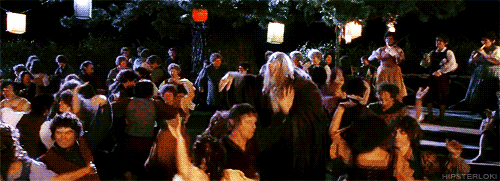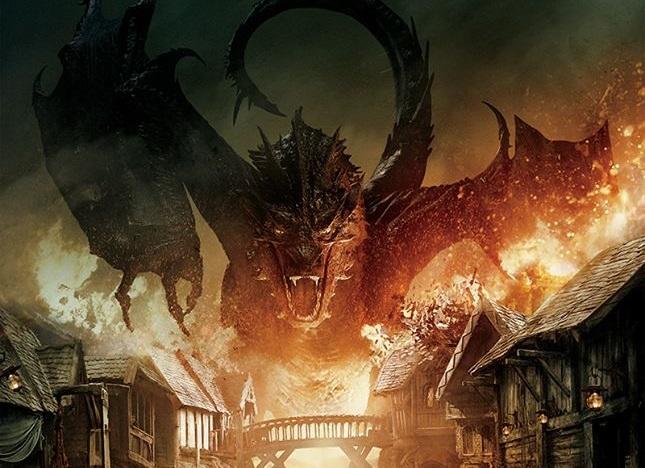I remember, a few years ago, I decided I wanted to read the Hobbit on my own. I think it must've been the year between the first and second Hobbit movies. So every afternoon for a few days, I sat in the closet in Daddy's library with the door shut, and I read. Out loud. I did every voice, in an odd mixture of movie, radio, and Rankin-Bass video. "Misty Mountains" in particular was quite... interesting. I used bits and pieces from each version of the song, and spoke the rest.
I think I'd gotten them out of the Misty Mountains by the time I stopped. I might have even reached Mirkwood. I don't really know. But I plan on going from Hobbiton to the Lonely Mountain and back again, all the way to the end. You guessed it: I'm starting to reread The Hobbit again, this very day. And I'll proceed from that on to Lord of the Rings. Until, "Well, I'm back."
If you could see me right now, you'd see me wearing a green medieval-looking shirt, leggings of the same colour, and a white puffy shirt. I even put a gold ring on a chain.
Why all this hubbub about Tolkien, you ask? I reply, saying; didn't you read the title? Today is the birthday of Fellowship of the Ring!
 |
| The Hobbits and Gandalf at a birthday party (from the book we're throwing a birthday party for, oddly enough) |
Its 63rd, to be precise. On July 29th, 1954, J. R. R. Tolkien's Fellowship of the Ring was released for the first time. Thus, all this. Of course, it wasn't the first book about hobbits old Tolkien had written, as I'm sure you know. The Hobbit, about a certain Bilbo Baggins and his adventures with dwarves, came out 17 years earlier.
These books have had numerous adaptations, including full-length movies, TV specials, radio dramas, and even a graphic novel. They have influenced many, many artists in their work. Musicians, for example.
Yet more so, the works of Tolkien have influenced storytellers. Sometimes, they are inspired to show his stories in other ways, such as film. Sometimes, it is in the way they tell their own tales. I remember someone once said "Most modern fantasy just rearranges the furniture in Tolkien's attic." Modern fantasy as in that which has been written after July 29th, 1954. I myself have been greatly inspired by it, as you may guess once my writings are up here as well.
Even those funny little things I talked about on Wednesday--the Silmaril Awards--were named after his Silmarillion, and his characters present the award, in each one as is most fitting. Sam Gamgee for Most Loyal Friend, Gandalf for Wisest Counselor, Tom Bombadil for Strangest Character, and so on. And each presentation is shown by way of a story. Each person will write exactly how the ceremony goes. And occasionally, there is some little adventure along with it--though it rarely is the sort that makes one late for dinner.
The work of Mr. Tolkien and the words of his characters have changed us. Not only in how we tell tales, but us, too. The way we act, the way we think about certain things. I, for one, can no longer walk down the road without thinking about how river-like it is, and where one might get swept off to if one doesn't keep his feet. And there are many other ways, as well. But in particular, it has changed the way we think about the tale we live in ourselves.
'But I suppose it's often that way [said Sam]. The brave things in the old tales and songs, Mr. Frodo: adventures, as I used to call them. I used to think that they were things the wonderful folk of the stories went out and looked for, because they wanted them, because they were exciting and life was a bit dull, a kind of a sport, as you might say. But that's not the way of it with the tales that really mattered, or the ones that stay in the mind. Folk seem to have been just landed in them, usually--their paths were laid out that way, as you put it. But I expect they had lots of chances, like us, of turning back, only they didn't. And if they had, we shouldn't know, because they'd have been forgotten. We hear about those as just went on--and not all to a good end, mind you; at least not to what folk inside a story and not out call a good end. You know, coming home, and finding things all right, though not quite the same--like old Mr. Bilbo. But those aren't always the best tales to hear, though they may be the best tales to get landed in! I wonder what sort of a tale we've fallen into?'
After these tales of a time "Between the Dawn of Faerie and the Dominion of Men", of the crownless again becoming king, and of hobbits that have gone There and Back Again, how could the world ever be the same?


